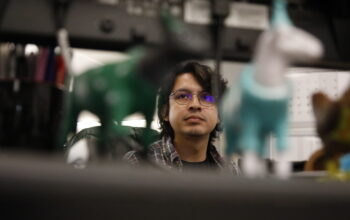Meet Albert.
Albert, who asked that his real name be withheld, is a 59-year-old former mortgage broker. In his free time he enjoys playing tennis, a little golf, dinner with friends and dabbling in photography.
He’s just a “regular” guy — who ran a medicinal marijuana co-operative in the Valley for three years.
A pot-smoker since 18, Albert decided in 2005 to get a medical marijuana prescription so that he could legally enjoy his high. Of course, today it’s possible to purchase medicinal marijuana online with ease, but back then this wasn’t an option for Albert.
“I thought you had to have cancer or something like that to get legal,” he said. “I found out how easy it was to get a doctor’s recommendation and I decided to get one.”
“I think it’s a pretty harmless drug,” he added. “I think it’s a great stress-reducer, I think it helps a lot of medical conditions and I think, compared to even cigarettes and alcohol it’s way down the list (of dangerous substances).”
Once Albert received a prescription, he discovered medicinal marijuana dispensaries where people could order edibles and other products –legalized in 2004 as part of Assembly Bill 420 — and found a new calling. The tough part for Albert was finding a location and someone who would rent to him. It took four months of driving up and down streets, day and night, calling every “For Lease” sign he saw.
“I almost gave up because I could not find anyone that would rent, they were all afraid,” he said.
He finally found someone who was willing to take a chance, and in August of 2006, Albert’s store opened for business.
At that point, medicinal marijuana had been legal in California for 10 years, but the federal government — under George W. Bush’s administration — was aggressively targeting cooperatives and dispensaries. Albert was worried about the possibility of getting arrested, but figured that since other people were doing it, he’d give it a shot. “I didn’t have kids or a wife or anything, (so) it wouldn’t have affected that many people if something happened, it would just affect me,” he said. This day in age it’s a little different with many young and old entrepreneurs wanting to try and get into the booming legal cannabis industry, with many of these companies trying to keep up with the best cannabusiness blogs to try to keep ahead in the everchanging, as well as young, industry that is cannabis.
Open for business
Even though buying and selling marijuana is prohibited by law, Albert explains that the reason cooperatives remain in business is because they “share” their product.
“A patient comes in and they have extra they can offer to you. They’re not really selling it,” he explains. “You’re paying them for their time and their trouble, (and) their costs of growing.” The costs and efforts of growing marijuana are often overlooked. Because of machinery like this rosin press, people assume that growing cannabis is easy. However, producing high quality cannabis can be difficult. Although, it’s fair to say that machinery has made it less time-consuming for growers. Although, because companies are “not allowed to sell it either… What you can do is you can offer it to (people) and get reimbursed for your costs and time and trouble. That’s the way you get around the law.”
Even though Albert was not allowed to take money, he paid taxes on the revenue from his store as per the Greater Los Angeles Caregivers’ Association — a voluntary, not-for-profit organization of medical marijuana dispensing collectives and cooperatives, working together to develop and implement safety and operational standards for medical cannabis facilities in the Los Angeles area, according to their Web site.
Comprised predominately of owners, GLACA enforces rules where the government doesn’t.
For example, GLACA asks that stores not be open passed 10 at night in so that you don’t attract the “wrong type of people.”
There is also a strict screening process for anyone entering stores. At Albert’s place, the first time a patient came in they had to bring their original doctor’s recommendation. Then, an employee would call the physician’s office to verify its legitimacy.
“We even go so far as to get the name of the person we spoke to one the phone at the doctor’s office and the date they went in (to get the recommendation), everything,” he said.
Once a member, a patient didn’t need to bring their original document, but did need a copy at all times.
“We just check them in every time they come in,” he describes. “We have a file for every member just to know that they are legitimate.”
Additionally, the law doesn’t limit the number of times a patient visits a co-op, but Albert’s place always had a rule that patients could not come more than once a day to limit illegal re-selling, which Albert said often happens with younger patients.
“Stressful” work environment
Once Albert was opened for business, he was confronted with a host of problems. Not only did he worry daily about the possibility of government raids, but he lived in constant fear of being robbed or burglarized, which happened twice.
The first time Albert was burglarized was in November of 2007. He was awoken in the middle of the night to a phone-call that “multiple alarms” were going off in his business.
“They took everything,” he said. “I lost $50,000.”
The second time he was more fortunate. The door was “busted down,” but the burgalers were scared off by the alarms.
To combat these occupational hazards Albert had an armed guard on the premises at all times — another GLACA rule.
“The guard is in charge of who comes in so patients are immediately made aware of his presence,” Albert explains.
Additionally, Albert’s work day didn’t end when the store closed. After being burglarized, he didn’t want to keep his product in the store, so he would take it to someplace safe.
“You don’t want to take it home incase somebody follows you or the government comes and busts you and raids your house also.”
He describes always needing to look over his shoulder because “there is a lot of money involved, you don’t know if people are laying in wait for you.”
Albert also didn’t like turning patients away. When people would come in with their product, Albert had a hard time saying no when he didn’t need more.
“You want to say yes, but you can’t buy all day,” he explains. “Turning a lot of people down is stressful. They’re patients you get to know over time and you want to help them out but you don’t want to overstock either. It’s just a very stressful business.”
Owning and operating a co-op ended up being more demanding than working in the mortgage business, which was ultimately the reason Albert sold the store.
From owner to patient
Towards the end of 2008, Albert was diagnosed with stage IV melanoma and was forced to sell his business.
“When you have cancer, you want to eliminate all of the stress in your life,” he said.
Now, Albert smokes pot to alleviate the pain and nausea caused by chemotherapy, he even attributes the fact that he didn’t detect the disease earlier to marijuana.
“Part of me thinks that because… people were coming in with samples all day long and I was trying it that I maybe didn’t notice that I was getting sick,” Albert says of his illness.
Albert also shares his knowledge about the health benefits of marijuana with members of the Wellness Community — a non-profit organization for people living with cancer.
“You have no idea how many people who are on on chemo that have no appetite and can’t keep food down that smoke marijuana. It helps them greatly.”
Albert isn’t the only proponent of using medicinal marijuana for medicinal purposes. It is also endorsed by the Association of People Living With AIDS, the American Nurses Association, the American Academy of Family Physicians, the Federation of American Scientists, the New England Journal of Medicine, the California Medical Association and the Lymphoma Foundation of America.
Even the United States Food and Drug Administration “recognizes the need for objective evaluations of the potential merits of cannabinoids for medical uses,” according to the Web site.
“Every culture since day one has used plants to heal. It’s a healer,” Albert said.
Although Albert sold his business a few years earlier than he wanted, he is glad he had the experience.
“I started a business from scratch,” he said. “I did it all by myself. It was quite an accomplishment.”



